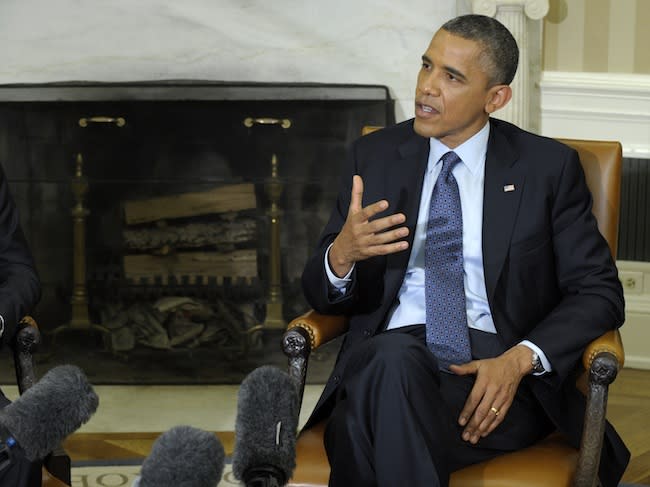 The Ticket
The TicketObama explains new immigration plan, while heckled by reporter in Rose Garden

In a speech this afternoon in the Rose Garden, President Barack Obama explained his administration's decision to allow as many as 800,000 young illegal immigrants to apply for temporary legal status and work permits.
Neil Munro, a reporter from the Daily Caller, interrupted the president twice, asking him to defend his statement that the move is the "right thing" for the country. Obama talked over the reporter but later in the speech addressed him, again asserting that the immigration decision is the right one. Munroe again interrupted Obama. "I didn't ask for an argument," the president said sharply, ending the unusual exchange.
Obama went on with his speech. "They are Americans in their hearts, in their minds, in every single way but one--on paper," he said of the young illegal immigrants who will be affected by his plan. The sweeping proposal allows immigrants without criminal records who are under 30 years old, entered the country as children, have graduated from a U.S. high school and can prove they've lived in the country for five consecutive years to apply for temporary legal status and then two-year, renewable work permits. It does not provide them a path to citizenship. In his speech, Obama stressed that the move is "not amnesty," and he thinks Congress should still pass a broader legalization bill.
The change could have big political implications. President Obama has faced criticism from the crucial Hispanic electorate for ramping up deportations under his tenure and for failing to deliver on his campaign promise to pass comprehensive immigration reform. Advocates and advisers worried that even though Obama enjoyed a big lead over Romney among Latino voters, a lack of enthusiasm could keep many of them home in key swing states like Nevada, Colorado, and Florida on Election Day. But his announcement is likely to generate interest among many Latinos: 87 percent of registered Latino voters said in a Latino Decisions poll that they support legalizing young immigrants.
Young people who were brought into the country illegally or overstayed their visas as children are commonly called "Dreamers," referencing the title of a decade-old bill that would have given them a path to citizenship if they joined the military or attended college. The Dream Act passed the House nearly two years ago, but was blocked by Republicans in the Senate. Opponents of the bill have argued that it would encourage more people to enter the country illegally. But supporters say it helps those who were brought up as Americans and whose lack of status is not their own fault become full members of society.
During the primary, Mitt Romney said he would veto the Dream Act, but in recent weeks he has seemed open to a proposal by Sen. Marco Rubio to grant Dreamers work permits but not a path to citizenship. Shortly after Obama's speech, Romney said the president's action would "make it more difficult to reach a long-term solution."
Romney adviser Kevin Madden said on MSNBC that the move is "political" and that Romney will stay focused on the economy. It's telling that the Romney team--eager not to alienate Latino voters--isn't attacking Obama on the substance of the move, but only the process and motivations behind it.
Many congressional Republicans are also criticizing the move as an executive overreach. "This decision avoids dealing with Congress and the American people instead of fixing a broken immigration system once and for all," wrote Sen. Lindsay Graham, one of the few congressional Republicans who supports immigration reform. "President Obama's decision to grant amnesty to potentially millions of illegal immigrants is a breach of faith with the American people," Rep. Lamar Smith, chairman of the House Judiciary Committee and a vocal illegal immigration opponent, said.
In the past, Obama has said he doesn't have the power to stop the deportation of Dreamers. "There are enough laws on the books by Congress that are very clear in terms of how we have to enforce our immigration system that for me to simply, through executive order, ignore those congressional mandates would not conform with my appropriate role as President," Obama told one Dreamer who asked him why he couldn't halt young people's deportations in March of 2011.
Holly Bailey contributed reporting to this story.


